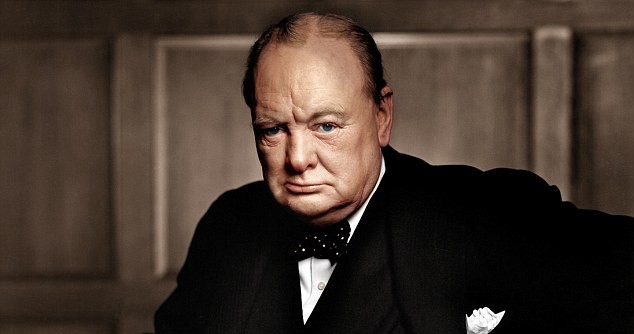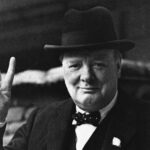Blog Post
Winston Churchill: A Surprising Champion of Christian Heritage
By Jonathon Van Maren
Fifty-seven years after his death, the cult of Winston Churchill shows no sign of flagging. At least sixty biographies were published by the end of the 20th century, and each passing year seems to bring a half dozen more. He is the subject of blockbuster Hollywood films (2011’s The Darkest Hour being the most recent) and new books that, astonishingly, manage to uncover fresh details (Erik Larson’s 2020 The Splendid and the Vile: A Saga of Churchill, Family, and Defiance During the Blitz being the best of the latest lot). Despite vigorous attempts to cancel him—statues of Churchill have been defaced and splashed with paint recently from Edmonton to London—he still looms large.
Churchill is now a mythical figure, and the number of those who remember him as a man is dwindling rapidly. I’ve spoken to only two: English author Os Guinness, who met him as a boy, and Churchill’s grandson, former MP Nicholas Soames, son of Mary Spencer-Churchill. Soames grew up at Chartwell and saw Churchill every day. “He was interested in everything we did,” Soames told me. “He came to watch us swim, he liked having his grandchildren around him.” He once slipped into Churchill’s bedroom, where he was reading a newspaper in bed. “Is it true that you’re the greatest living man, Grandad?” he asked. “Yes,” Churchill replied. “Now bugger off and leave me in peace.”
But in recent years, the Churchill myth has come under fire not only by progressives seeking to cancel anyone not born fifteen minutes ago, but also by conservatives. Columnist Peter Hitchens wrote in 2018 that it is “time we faced the unpalatable truth that Winston’s vanity and recklessness cost countless British lives and lost us our empire”—although he concedes that it is “[b]eyond doubt” that Churchill “saved Britain and probably the world when he rightly refused to parley with Hitler in 1940.”
Nevertheless, Hitchens believes that World War II has replaced Christianity as Great Britain’s reigning religion, with Churchill at the centre. “Instead of the triumphal ride into Jerusalem, the Last Supper, and the betrayal at Gethsemane, the Crucifixion and the Resurrection, we have a modern substitute: Winston the outcast prophet in the wilderness, living on cigars and champagne rather than locusts and wild honey, but slighted, exiled, and prophetic all the same.”
In his 2018 book The Phoney Victory, Hitchens described the World War II religion he grew up with:
This war is the dominant theme of serious conversation, a source of metaphors and a frame of thought. It is also our moral guide, the origin of modern scripture about good and evil, courage and self-sacrifice … it is at Dunkirk and D-Day, or in the forests of Burma, or in the prisoner-of-war camps of Silesia or the Far East, where brave Britons of all classes defy their captors or in the freezing midnight clashes between escort ship and U-boat, that we find our lessons about how to be good and live well. The stories of the Good Samaritan and the Prodigal Son cannot compare with this. Even the Crucifixion grows pale and faint in the lurid light of air raids and great columns of burning oil at Dunkirk, a pillar of fire by night, a pillar of cloud by day.
One suspects that Churchill would not have objected to deification. “I am ready to meet my Maker,” he once blasphemously stated. “Whether my Maker is prepared for the ordeal of meeting me is another matter.” Churchill saw himself as a defender of Christendom, but not necessarily as a personal Christian. “I am not a pillar of the church, but a buttress—I support it from the outside,” he once said. And as Hitchens notes, some horrifying things were done by the Allies under Churchill’s leadership—the firebombing of Hamburg may have been code-named Operation Gomorrah, but the Lancasters raining hell on men, women, and children brought the thunder of Europe’s long-dead gods rather than the vengeance of the Almighty.
So what did the now-deified Churchill think of God and Christianity? It is a question that Churchill’s great-grandson Jonathan Sandys, who tragically died of lung disease at the age of 43, attempted to answer in his 2015 book God and Churchill, a fascinating albeit not particularly well-written scattershot analysis of Churchill’s spiritual beliefs. The book received harsh criticism from British historian Alistair Lexden, who insisted that Churchill was an agnostic and as proof quoted him as saying in the 1890s that, “Christianity will be put aside as the crutch which is no longer needed, and man will stand erect on the firm legs of reason.”
Lexden’s criticism, however, is based not on what Churchill actually believed but on his own apparent disdain for the idea that God works in history. It is not difficult for a Christian to accept that God used Winston Churchill to defend civilization, since Christians believe that His providence directs all things. But to an atheist or an agnostic, this idea is ridiculous. Lexden’s cherry-picked quote ignores many of his other statements and writings that reflect an evolution in his thinking, many of them made after that comment.
Churchill was introduced to Christianity not by his parents—who largely ignored him to pursue their own interests (including other romantic partners)—but by his nanny Elizabeth Everest, whose influence on Churchill was life-long. When he died at the age 90, a framed photo of her still stood beside his bed 70 years after her death. It was through her, Sandys suggests, that Churchill first began to treasure the Christian religion.
A closer look at Churchill’s life indicates that he took Christianity seriously, and perhaps sometimes even personally. This is precisely why, when Sandys was considering the project, he was urged by Churchill biographer Sir Martin Gilbert to start digging as there was “loads of information.” As early as 1897, for example, Churchill wrote that, “It is evident that Christianity, however degraded and distorted by cruelty and intolerance, must always exert a modifying influence on men’s passions, and protect them from the more violent forms of fanatical fever, as we are protected from smallpox by vaccination.”
And what, for example, would Lexden make of Churchill’s recounting of his escape from a Boer prison camp in 1899? While walking through South Africa, surrounded by enemies and unsure of where to turn, Churchill wrote:
I found no comfort in any of the philosophical ideas which some men parade in their hours of ease and strength and safety. They seemed only fair-weather friends. I realised with awful force that no exercise of my own feeble will and strength could save me from my enemies, and that without the assistance of that High Power which interferes in the eternal sequence of causes and effects more often than we are always prone to admit, I could never succeed. I prayed long and earnestly for help and guidance. My prayer, as it seems to me, was swiftly and wonderfully answered.
Churchill’s doubts vanished in that moment of prayer, confidence came to him, and he knocked on the door of the only house for twenty miles that would not have turned him in to his Boer captors. Later, he would experience many other close calls, including near-miraculous moments in the trenches of the Great War when he seemed to be called from the front lines at precisely the right moments. He became convinced that this was because God had a specific purpose for his life, and as prime minister, he told his worried bodyguard that nothing would happen to him as long as his task was before him. “The old man is very good to me,” he once noted gravely to Sir David Maxwell-Fyfe. “What old man?” asked his companion. “God,” Churchill replied.








